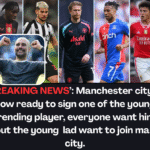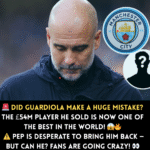Pep Guardiola could really regret selling £54m player, his future is uncertain at Manchester City

Manchester City’s 2025 summer transfer window represents a pivotal moment in the club’s recent history. After enduring their first trophyless season in years, Pep Guardiola and the City hierarchy have embarked on an ambitious reconstruction project that could determine the trajectory of the club for seasons to come. At the heart of this transformation lies a fascinating tactical and financial puzzle centered around Matheus Nunes, the Portuguese midfielder whose £54.5 million acquisition has evolved into one of the most intriguing positional experiments in modern football.
The Sky Blues’ recent acquisitions of Rayan Ait-Nouri, Tijjani Reijnders, and Rayan Cherki signal a clear intent to address the qualitative issues that plagued their previous campaign. However, it is the uncertain future of Nunes that presents perhaps the most compelling narrative of City’s summer rebuild. His potential departure could represent a significant strategic miscalculation that Guardiola may come to regret, particularly given the Portuguese international’s unexpected emergence as a viable solution to City’s right-back conundrum.
The Genesis of City’s Defensive Dilemma
Manchester City’s defensive challenges during the 2024-25 season were multifaceted and deeply rooted in personnel limitations that exposed the squad’s lack of tactical flexibility. The absence of Rodri through his ACL injury served as the most visible symptom of City’s structural problems, but the issues extended far beyond the Spanish midfielder’s temporary unavailability. The full-back positions, in particular, became areas of considerable concern as Guardiola struggled to find consistent solutions that could provide both defensive stability and the attacking impetus that his system demands.
Kyle Walker, despite his legendary status at the club and his remarkable longevity at the highest level, has increasingly shown signs of decline that are perhaps inevitable for a player approaching the twilight of his career. His pace, once his most devastating weapon, has diminished sufficiently to make him vulnerable against the Premier League’s most dynamic wingers. More concerning from a tactical perspective has been Walker’s reduced effectiveness in City’s build-up play, where his passing range and decision-making have become increasingly predictable for opposition teams to counter.
The club’s pursuit of Tino Livramento from Newcastle United represents a clear acknowledgment of these limitations. At 22, Livramento possesses the physical attributes and technical skills that align perfectly with Guardiola’s tactical requirements for a modern full-back. His ability to contribute in both phases of play, combined with his Premier League experience and room for further development, makes him an ideal long-term successor to Walker. However, Newcastle’s reluctance to part with the defender, coupled with Eddie Howe’s public statements regarding Livramento’s importance to their project, suggests that City may need to explore alternative solutions.
Nunes: The Unlikely Solution to a Complex Problem
The transformation of Matheus Nunes from an underutilized central midfielder to a functioning right-back represents one of Guardiola’s most fascinating tactical experiments in recent years. When City acquired Nunes from Wolverhampton Wanderers for £54.5 million, the expectation was that he would provide depth and competition in the engine room, potentially offering a different profile to the technically gifted but physically limited midfielders that had dominated City’s setup.
However, Nunes’ initial struggles to adapt to City’s intricate passing patterns and positional requirements in midfield led to questions about the wisdom of such a substantial investment. Guardiola’s frank assessment that Nunes lacked the composure and intelligence required for central midfield duties appeared to signal the end of his City career before it had truly begun. Yet, rather than cutting their losses, the coaching staff identified alternative ways to utilize the Portuguese international’s unique skill set.
The conversion to right-back has revealed aspects of Nunes’ game that were perhaps underappreciated during his time at Wolves. His physical attributes – pace, strength, and aerial ability – translate effectively to defensive duties, while his natural attacking instincts have proven valuable in providing width and crossing opportunities from advanced positions. Most importantly, his work rate and willingness to track back have addressed some of the defensive vulnerabilities that City experienced when deploying more attack-minded players in wide defensive roles.
Tactical Analysis: How Nunes Fits Guardiola’s System
Guardiola’s tactical system places enormous demands on full-backs, requiring them to function essentially as auxiliary midfielders when City have possession while maintaining the defensive discipline necessary to handle counter-attacks and set-piece situations. This dual responsibility has made the full-back positions among the most challenging to fill in modern football, with only a select few players possessing the complete skill set required to excel in both phases of play.
Nunes’ adaptation to the right-back role has demonstrated several key strengths that align with Guardiola’s tactical requirements. His pace allows him to recover defensive positions quickly after pushing forward in attack, providing the security necessary for City’s aggressive high-line approach. His crossing ability, developed during his time as a winger and attacking midfielder, offers a different dimension to City’s attacking play, particularly when they struggle to break down deep-lying defensive blocks through central areas.
Perhaps most significantly, Nunes’ physical presence provides City with an asset they have occasionally lacked in recent seasons. His ability to win aerial duels and compete physically with opposition wingers gives Guardiola tactical options that were not available with some of City’s more technically gifted but physically limited defensive options. This physicality has proven particularly valuable in matches against teams that rely on direct play and crossing situations.
The Portuguese international’s intelligence in reading the game has also improved markedly since his positional switch. His understanding of when to push forward and when to hold position has developed through experience, and his communication with teammates has enhanced City’s overall defensive organization. These improvements suggest that Nunes’ adaptation to the right-back role is not merely a temporary tactical expedient but could represent a genuine long-term solution.
The Financial Implications of Nunes’ Departure
From a financial perspective, any decision to sell Nunes would need to be evaluated against the backdrop of City’s substantial initial investment and the current market conditions for versatile defensive players. The £54.5 million fee paid to Wolves represented a significant outlay for a player who was not considered a guaranteed starter, and recovering that investment would require finding buyers willing to match City’s valuation.
The modern transfer market’s inflation means that finding adequate replacements for Nunes could prove more expensive than retaining his services. Full-backs with the physical attributes and tactical intelligence required for top-level football command premium fees, particularly when they possess the versatility to operate in multiple positions. City’s interest in Kiliann Sildillia from SC Freiburg illustrates this point, as even players from smaller European leagues now command substantial transfer fees when they demonstrate the potential to succeed at elite clubs.
Furthermore, the financial benefits of retaining Nunes extend beyond simple transfer fee considerations. His wages, while substantial, are likely to be lower than those commanded by established international defenders, providing City with cost-effective squad depth. His versatility also means that City can maintain smaller squad sizes without sacrificing tactical flexibility, as Nunes can provide cover for multiple positions depending on injuries and tactical requirements.
The potential impact on Financial Fair Play considerations cannot be ignored either. City’s recent transfer activity has been substantial, and retaining assets rather than selling them at potentially reduced values could help balance their books while maintaining competitive strength. This financial pragmatism aligns with the club’s long-term sustainability objectives while supporting their immediate competitive ambitions.
Comparative Analysis: Nunes vs. Alternative Options
When evaluating Nunes’ contribution relative to other options available to City, several factors emerge that support the argument for his retention. Rico Lewis, despite his undoubted talent and promising development trajectory, faces questions about his physical suitability for the demands of Premier League football as a full-back. His slight build and lack of aerial presence could be exploited by opposition teams, particularly in crucial matches where physicality becomes a determining factor.
Manuel Akanji’s versatility has made him valuable to City across multiple positions, but his deployment at right-back represents a compromise rather than an optimal solution. While his technical skills and tactical intelligence allow him to function adequately in the role, his natural instincts as a center-back sometimes leave City exposed in advanced positions where a natural full-back would provide better attacking support.
The comparison with potential transfer targets further strengthens the case for Nunes’ retention. Livramento, while representing the ideal profile for City’s long-term plans, remains at Newcastle and could command a transfer fee that exceeds City’s valuation. Sildillia, despite his promise, would require time to adapt to Premier League football and Guardiola’s tactical demands, potentially leaving City vulnerable during a crucial period of adjustment.
Nunes’ existing familiarity with City’s playing style, combined with his demonstrated ability to perform at the required level, provides immediate value that cannot be easily replicated through new signings. His understanding of Guardiola’s tactical nuances and his established relationships with teammates represent intangible assets that contribute to squad cohesion and tactical fluidity.
The Broader Strategic Context
City’s decision regarding Nunes must be considered within the broader context of their squad planning and competitive objectives. The club’s ambitions across multiple competitions demand depth and versatility that allows for tactical adjustments and rotation without significant drops in quality. Nunes’ ability to contribute in different positions and tactical setups provides Guardiola with options that could prove crucial during congested fixture periods.
The integration of new signings like Cherki, Reijnders, and Ait-Nouri will require careful management to ensure tactical cohesion while maintaining competitive performance levels. Retaining experienced squad members who understand the club’s methods and expectations could facilitate this integration process while providing stability during a period of transition.
Competition considerations also favor Nunes’ retention. The Champions League, in particular, demands tactical flexibility and squad depth that allows teams to adapt to different opponents and match situations. Nunes’ versatility could prove valuable in knockout competitions where tactical adjustments and player availability can determine success or failure.
Youth Development and Squad Balance
City’s approach to youth development has always balanced the integration of promising academy graduates with the retention of experienced professionals who can guide their development. Rico Lewis represents the club’s most promising defensive prospect, but his long-term development could benefit from reduced pressure and gradual integration rather than immediate first-team responsibilities.
Nunes’ presence provides Lewis with an opportunity to learn from an experienced professional while developing his own game at a sustainable pace. This mentorship aspect of squad building is often overlooked but represents a crucial component of successful talent development programs. The Portuguese international’s work ethic and professionalism could positively influence younger players while contributing to the overall squad culture.
The balance between experience and youth in City’s squad also affects their tactical options and game management capabilities. Experienced players like Nunes can provide leadership and decision-making in crucial moments, while younger players may lack the composure necessary for high-pressure situations. This balance becomes particularly important during the latter stages of competitions where experience often proves decisive.
Market Dynamics and Future Planning
The current transfer market presents unique challenges for clubs seeking to strengthen their squads while managing financial constraints. The inflated valuations for defensive players, combined with the limited availability of quality options, suggest that retaining proven performers like Nunes could represent better value than pursuing alternatives in the transfer market.
Future planning considerations also support Nunes’ retention. His contract situation and age profile align with City’s medium-term planning objectives, providing the club with an asset that can contribute immediately while retaining future value. This approach allows City to pursue long-term targets like Livramento while maintaining competitive strength in the interim.
The potential for Nunes’ market value to increase through continued strong performances cannot be ignored either. His successful adaptation to the right-back role has demonstrated versatility that increases his attractiveness to potential buyers, suggesting that City could recover their investment or even profit from his eventual sale if circumstances change.
Conclusion: The Case for Patience and Strategic Thinking
The debate surrounding Matheus Nunes’ future at Manchester City encapsulates the complex considerations that define modern football club management. His transformation from an expensive midfield acquisition to a functional right-back solution represents both the challenges and opportunities inherent in elite squad building.
The evidence strongly suggests that Guardiola and City’s decision-makers should resist the temptation to recoup their investment through Nunes’ sale. His demonstrated ability to perform at the required level, combined with his versatility and the current market conditions, makes retention the logical choice. The financial implications, tactical benefits, and strategic considerations all align to support his continued presence in City’s squad.
Moreover, the potential regret associated with his departure could extend beyond immediate tactical considerations. If Nunes continues to develop in his new role while City struggle to find adequate replacements, the decision to sell could represent a significant strategic miscalculation. The modern game’s demands for versatile, intelligent players who can adapt to different tactical requirements make Nunes exactly the type of asset that successful clubs should retain and develop.
City’s summer transfer activity demonstrates their commitment to returning to the pinnacle of European football. In this context, Nunes represents not just a functional squad player but a symbol of the club’s ability to maximize the potential of their investments through innovative coaching and tactical flexibility. His story serves as a reminder that success in modern football often comes from making the most of existing resources rather than constantly seeking external solutions.
The ultimate test of this decision will come during the demanding season ahead, where City’s pursuit of multiple trophies will require every squad member to contribute to their collective success. If Nunes continues to provide reliable performances while contributing to the team’s tactical flexibility, his retention will be vindicated as another example of Guardiola’s coaching brilliance and City’s strategic thinking. The alternative – watching him succeed elsewhere while City struggle to replace his contributions – represents a risk that the club would be wise to avoid.















